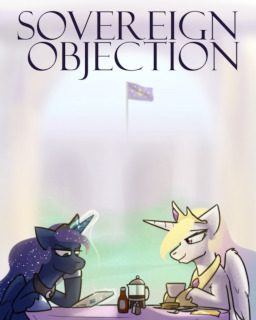
March 2nd, 2016
“Whatever is the matter, sister? You look positively distraught.”
Luna sighed in the doorway of the veranda, before sloping to the table to pour herself some juice. “I try to limit the stock I place in the details of dreams. Sometimes they are very literal, and sometimes they are borderline incomprehensible. I feel as if I have stumbled upon one that is both.”
“There is a standing offer for psychiatric counselling for you, Luna.”
Luna squinted for a moment, but continued. “It was a dream of end times. A personal apocalypse. A life in flames.”
“Oh.”
“It would not be the first time I have walked the dream of someone on the precipice of suicide. I have accepted this unhappy labour. You have long been familiar with this.”
“For centuries.”
“What disturbs me so is how... uniquely powerless I felt to intervene. Many of the things that drive one to end their own life are timeless. Material misery and personal heartbreak are as old as time. But...”
“The incomprehensible part.”
“I could not understand a single thing this unfortunate soul was saying. Sub-prime this, mortgage securities that.”
Celestia’s brow furrowed, and she hesitated with her coffee.
“As far as I could tell he was a successful businessman with a family of some sort. And I have been reading up on the latest theories of psychology, I know that things can plague a mind that otherwise lives a life of ease, and I’ve begun to learn the signs. This was none of those.”
“I... think I may be able to explain this one.”
Luna raised a brow from where she slumped, chin resting on the table.
“Though I will also need to schedule a call with the Prime Minister about this.”
“Is it that serious? I know I’m normally the one arguing the corner of personal empathy for a struggling individual, but surely we should be contacting physicians, not politicians.”
“Oh, well... that too? But... how about I just explain, that should clear things up.”
“If I can bear it.”
“What you witnessed may have been the early warning signs of a financial crash. Or perhaps a company is about to implode, or maybe there’s a securities fraud case about to blow wide open.”
Luna focused her eyes thoughtfully.
“Okay. Let me try again. Your unhappy man has probably realised that he is about to lose more money than most ponies ever see in their whole lives.”
“Surely if there was a robbery of that scale it would be in the news.”
“That’s the thing, it’s not... robbery, as such. Have you been reading much into how financial markets work?”
“I tried, but it was nigh impenetrable. I decided that the finer details could wait, since there were more important things to catch up on.”
“Unfortunately it just jumped up the priority list.”
Luna groaned.
“How far did you get?”
“Uh... the concept of shares?”
Celestia looked at her coffee, then refilled the cup. “Okay. So we’re going back to... the 17th, 18th centuries. It’s a bit of a hike from here to what I need to talk to the Prime Minister about, so...”
Luna gladly accepted the offer of coffee.
“Equestria’s new order is settling in with new ways of doing things, where the power of the merchants is ascendant. Now that the aristocracy isn’t standing in their way, their enterprises are growing, and with larger enterprises there’s a need for greater investment – more than one pony can contribute at once. Which is how you get shares.”
“I’m with you so far. You buy a share in the company and in return you receive a portion of the company’s profits as a dividend. This came up when I was reading more about the South Seas Company.”
“It’s that era, yes. Now, from time to time it becomes necessary to exchange these shares – when the previous holder doesn’t want it anymore. So ponies began to buy and sell them. And then a funny thing happened. The value of the shares began to diverge from the value of the dividend.”
Luna scrunched her nose.
“Think about it. If you hold a share in a company that you expect to become highly profitable in the future, you can sell it for more than you bought it.”
“But that’s obviously fraudulent. You’re trading on value that doesn’t exist.”
Celestia chuckled. “It’s not fraud, Luna. It’s speculation. It’s only fraud if the value is based on false information. If I sell you ten eggs and only five of them hatch, I haven’t defrauded you, it was just unlucky. If I sold you ten rocks and said they were eggs, then that would be fraud.”
“But you can see how this would be a magnet for fraudsters and confidence men. All they need to do is convince you to buy in, and then the company can mysteriously founder through no fault of the proprietors.”
“How is it that you can’t get your head around the language of modern finance but it takes you less than a minute to figure out how to commit basic securities fraud?”
“Something tells me those two things are not as unrelated as they seem.”
“... We’ll get there. But yes, the speculative nature of the stock market does expose it to the occasional enterprising thief. This is why we have laws and regulations around companies that issue publicly traded shares – the company’s board are legally obliged to act in the interests of the shareholders. If they are found to be acting against the interests of their investors, they can be prosecuted for fraud. Though usually they get pushed out by the shareholders themselves before that can happen.”
Luna smirked. “And was this a lesson learned the hard way?”
Celestia paused for a moment. “Okay, we’ll talk about the Tenebria Company real quick.”
“I knew it!”
“During the height of the South Seas Company’s wealth and power, investors were looking for the next big opportunity. Trading enterprises in Kirea and Viridia, for example. Nothing ever approached the South Seas Company in value or longevity, but in terms of notoriety, the Tenebria Company comes close. Tenebria – if you’ve been brushing up on your geography – is the continent at the bottom of the world.”
“The Land of Darkness, yes. So called because it was discovered during polar winter and the explorers saw not the sun for months.”
“But there is that spindly projection northwards. As best we can tell, nobody has ever lived in Tenebria, aside from a few okapi villages whose remains were discovered by archaeologists, but the land was considered a candidate for mineral prospecting, and the arcane storms there were ripe for study. So a company was set up to fund the exploration and colonisation of this newly discovered land.”
“And?”
“Well... the proprietors never delivered. They just kept raising money by selling shares. They created a bubble, a cloud of excitement around the company that was wildly disproportionate to any possible returns they could make. It turns out that Tenebria is a significantly more hostile land than they anticipated. Even today a mining operation there would be very difficult to make profitable, due to the distance and danger involved. But because it was the far side of the world, and they were practically the only people going there, they could keep this information from getting back to Equestria, and the rollercoaster could keep going up.”
“Did you buy in?”
Celestia chuckled bashfully. “I was sceptical of the whole enterprise from the start because I was kept well abreast of the latest exploration news, and them being able to turn a profit on Tenebria seemed like an unrealistic promise, but... I must concede that I did buy one. Just in case. That may even have been one of the things that precipitated the crumble of the operation, because now they were defrauding the sovereign personally.”
“Goodness. So how did the... bubble burst?”
“Slowly, and then all at once. They kept it going for a long time by paying dividends to early shareholders with the money raised from newer ones – which is its own financial crime, known as a pyramid scheme. But sooner or later, they ran out of new investors, and the jig was up. Dividends dried up, so ponies started selling, and as more ponies started looking to sell, the price they could get for those shares dropped as the market became flooded. Almost overnight, the Tenebria Company was worthless, and the proprietors were apprehended trying to flee to Grifreich with the money.”
“So the thieves were caught in the end?”
“Kind of. The physical bills of exchange they were carrying were recovered, but they left a trail of chaos in their wake. The only winners out of the whole situation were the lucky few that sold at the peak, right before it all came crashing down. Countless small investors and even ordinary people who had never bought a share before in their lives lost everything they put in because their investments went to pay the dividends of existing shareholders. Riots followed, as did a hit for the whole stock market. It was a body blow to the South Seas Company that definitely contributed to its dissolution.”
“I thought it was its brutality that prompted its closure.”
“It was! But it wasn’t the only thing. The end of the South Seas Company, the Tenebria bubble, and the Great Everfree War all happen inside the same 25 years or so, and they’re all causally related in complex ways that would extend this tangent even further.”
Luna chuffed. “Very well. So we have concluded that the merchants built themselves marketplace with which to commit fraud with impunity, held back from picking every pocket in the land only by regulations written with the ashes left behind by the time that they did.”
Celestia winced, thought about it for a moment, then nodded sagely. “Close enough. So anyway, this was unfortunately not the last stock market malfunction that Equestria has had to deal with. The rules were in place, but the impulse to greed remained. The darkest corners of the soul are hard to expunge. The nation suffered some minor crises through the 19th century in response to shocks such as the unrest after the Rapport, the Kwadube revolution, the Great Northern War, and so on.”
“The Great Northern what.”
“Oh, you missed that?”
“Somehow, apparently!”
“It’s... a misadventure. The Dragon Lord Agniskar II escalated a dispute with Kirea over Crane Island, Equestria and Grifreich got involved in a three-way alliance against the dragons, lots of nasty fighting over remote northern islands that may have had mineral wealth on them. Tremendous waste of blood and treasure. The only real winner was Grifreich because it consolidated their unity.”
“I suppose it’s not completely us against the world.”
“The knock-on effects in Kirean history are fascinating, because it led pretty directly to the colonisation of the Summer Islands, and the spiral of events that precipitated their transition from a sort-of feudal state to a modern democracy, but it’s complicated because their feudal system had republican elements, it’s a whole other thing we don’t have time to get into.”
“Yes. Staying on task. Financial shocks.”
"As you may remember from how Sylvanian independence started a chain of events that led to the Grail administration, economic problems have increasingly not respected national borders. This vulnerability has only increased since then as global markets have become more interconnected. An equipment failure in a silicon mine in Yakyakistan causes Kirean electronics plants to fall behind which causes a shortage of hire cars in Manehattan. Which is why even though financial regulations have mounted over the years, it remains just as much of a problem as ever, because the stakes have gotten higher.”
“I see.”
“Now, your unfortunate dreamer... This is something I’ve been keeping one eye on for a while. We may be about to run into a property crisis.”
Luna’s face remained blank.
“As in, a collapse in the value of property.”
Luna quizzically lifted a plate.
“No, not- okay. Housing, offices. Land.”
“Oh, I see.”
“Housing has been steadily rising in value for a long time, and we fear part of that value may be speculative.”
“Speculative trading on housing seems a like a waste, but I suppose if it causes ponies to be unable to find shelter, they can always build a new dwelling somewhere in the commons.”
Celestia paused.
“You’re giving me a look.”
“How do I break this to you... I regret to inform you that Equestria has not had any common land for over 200 years.”
“What?!”
“There was a process of land enclosure that began... sort of in tandem with the development of share markets. Piecemeal, unclaimed land was claimed by anyone who could assert that claim. It actually contributed greatly to food production, because farms could be consolidated and made more efficient. The crown even got in on the act to preserve the character of the land in some places, because usually private claims were about expanding agriculture.”
“This does change the severity of the situation considerably... and puts so many other nightmares into context. If one’s only option for shelter is to compete with merchants trading housing like shares, then it’s a miracle anyone has anywhere to live at all.”
“Well... that’s what a mortgage is for. There’s a whole class of loans specifically for houses, designed to be paid off over the course of twenty years or so.”
“That’s the solution? Not content with assigning ownership to every scrap of land and driving its value to irrational heights, the only way the common pony can obtain a dwelling is to become indebted to the same merchant class that caused the problem in the first place? Because I’m under no illusion that the same people are going to be running both sides of this show.”
“It’s hardly perfect, but the only alternatives would be letting millions go unhoused, have the majority of people rent for their whole lives, or confiscate vast amounts of private land. And this is the 21st century, we cannot just run roughshod over the law. At least with mortgages ponies have a stable investment to pass on to their children.”
“An investment. Of course everyone must become an investor just to survive, nobody can have a quiet life.”
“Now you’re just picking on my choice of words.”
“Pah, I suppose. At least if house prices fall then they should come into the reach of the average person again.”
Celestia made a noise like a creaky door.
“Oh, don’t tell me there’s more.”
“What’s so worrying about a housing crash is that it’s still likely to concentrate wealth, not distribute it.”
“Someone always has an angle, don’t they?”
“This is unfortunately not the first housing bubble, we had one in the 1970s, so we know what happens. First is that a lot of ordinary people, especially those who bought houses in the few years before the bubble bursts, get stuck with negative equity. Their house is worth less than when they bought it, which means their mortgage is more expensive than it should be. This increases the likelihood that they’ll have to default, which accelerates wider market consequences. It also means that if they sell their house, it won’t cover the whole value of the mortgage, so they’ll still have that debt. Second, the people who are in a position to buy houses during a market crash tend not to be ordinary people, they’re...”
“The already wealthy.”
“Correct. Large renting companies, or just... more speculators.”
“Why doesn’t the government buy up these houses, then? Or even the crown? We could stabilise the market. Provide affordable housing options for people who can’t afford to invest.”
“Well... I could suggest that to the Prime Minister, and it would be popular with the left of the party, but I doubt it would get a majority in parliament. A lot of ministers are landlords themselves, even in the Labour party, so it would be undermining their own investments.”
“I’m sorry, what?”
“You’re obviously free to deploy your own stipend to whatever end you see fit, but the sheer scale of the national housing market is such that your efforts are unlikely to change the tide.”
“No, go back. There are landlords in the Labour party?”
Celestia blinked. “Yes? Not all landlords are greedy parasites. Sometimes you just own more than one house and allow someone to live in the one you’re not living in.”
“And they joined the party of the workers. You don’t see this as a contradiction in principles?”
“Not necessarily, there are many reasons to hold a particular party allegiance.”
“You know what, never mind. What is the government likely to do, then?”
“A stock trader having a nightmare isn’t quite substantial enough to base policy on, but I can recommend an inquiry into the state of the housing market. Then the government can make preparations to soften the blow.”
“Soften the blow... how?”
Celestia frowned. “Bail out failing banks, likely. Before you object, this is a necessary medicine. If a major financial institution is allowed to go out of business, it creates an even larger wave of chaos – people and businesses lose access to savings and banking services, which will inevitably cause jobs to be lost, businesses to close, and debts to be bought up by collectors. If we set the government buying houses ourselves, we might get a few thousand people on the property ladder. If we stop the banks from collapsing, we mitigate an economic fire that affects millions – including outside Equestria.”
“So I’m to believe that we’ve created a system where the price of basic shelter needs to keep going up forever, or the entire world’s financial system will explode?”
“It sounds crazy when you put it like that, but...”
“It is crazy! It’s ludicrous on its face! Is there infinite money in the world to pay for all this?”
“Actually, sort of?”
“I’m going to bed.”
“You know, that’s reasonable, I wouldn’t want to discuss monetary policy when I’m tired either.”




















How many more chapters can Luna last until she becomes Nightmare Moon again?
Somepony tell Luna about credit default swaps so she can take one out!
This chapter sure reads like one of those "truth is stranger than fiction" things, because when it's phrased this way our modern financial system sounds like something thrown together by Terry Pratchett to make fun of financial systems...
11811391
That honestly feels like the only way to fix the world. Shame she can't do it in ours.
11811391
i give her . . . 2 and a half. can't do more.
Such unsubtle criticism xDDD
We are here IRL, BTW
I want a full ass chapter where Luna has to learn about fiat currency and how it only has value because the Government Says So but actually no it has value because banks say so but also the banks don't survive without the government so it's really the government and
And then Celestia gets to the invention of Pony Crypto (I suppose Bitcoin would be a bit on the nose given they use coins called bits) and Luna leaves.
11811391
inb4 the story ends with luna becoming nightmare moon, bringing eternal night, leading directly into sunjackersThat bit had me rolling, I love it.
11811786
The sad part is, a strike isn't even completely necessary in a collective bargaining agreement. We can legitimately look at APWU, which was founded by executive order and is legally forbidden from going on strike, but still manages to get continuous concessions for members and nonmembers alike who work for USPS
Interestingly enough, that appears to have not been as true in RL as people believe:
https://kevinerdmann.substack.com/p/countrywide-financial-didnt-cause
Subprime mortgages didn't cause the Great Recession, it was the risky CDOs themselves- and they would have imploded even if home prices stayed high. Apparently, banks successfully issued subprime mortgages for decades before CDOs without having big losses.
In fact, the lack of subprime mortgages after 2008 probably caused a large part of the current housing supply crisis in the U.S by turning off an important source of new homebuilding for working class families! This ran straight into America's love of strict land use laws which prevented the construction of more multifamily housing, which led to a giant increase in rents.
11811709
See my comment above- Interestingly, it wasn't housing as an investment itself that caused the issue- people in America invested in housing for decades without a nationwide financial crisis or any need for housing prices to need going up.
11811751
diamonddoge would be more appropriate what with their virtual mines.
11812991
I feel like you may have missed the forest for the trees there, bud
11815233
People in America invested in housing for decades without a nationwide financial crisis or any need for housing prices to need going up. I think that the forest is much different then what a lot of people think it is.
11815290
I don't want to get super into it as the author because the text had a chance to speak for itself but I think you need that little extra push to consider the question of why there is a housing market at all
11815418
There is a housing market (I'm talking about technical factors instead of historical factors) because central planning is too inefficient to successfully provide enough housing:
http://bactra.org/weblog/918.html
Tl;dr for things like consumer goods and housing, there are too many variables for central planners to take into account to successfully allocate everyone what they need. When the Soviets tried it, they got their infamously ineffective economy and constant shortages of housing. Eventually they turned to coops markets and grey market developers to provide enough housing.
There's also the lack of enough budget constraints for many situations in Soviet style central planning for consumer goods, which led to firms hoarding workers and materials, which led to constant supply shortages: https://www.apricitas.io/p/monetary-policy-in-a-shortage-economy
What Marx called "primitive communism" works on a small scale, but for a large scale society, it runs into many of the same problems as central planning.
Now, you will object that current housing markets in America do not provide enough housing right now.
But they *used* to.
https://kevinerdmann.substack.com/p/countrywide-financial-didnt-cause
"Of course, as I document here at the tracker, the result of that moral panic [over mortgages to low income people]
has been that low end homes in cities across the country are now more expensive than ever. Figure 7 compares the price/income changes of 2008 to 2012 to the changes from 2012 to today. Now, there’s a chart that screams “subprime lending bubble” if only there was any subprime lending to pin it on!"
This is a whole other story, but here's a taste of it.
11815290
We have a housing crisis precisely because people have treated them as investment for decades. The subprime mortgage crisis was a symptom, not a cause. It occurred because the cost of housing got to the point where borrowers needed to take out risky mortgages in order to be in the market, and lenders made bad decisions in trying to maximize profit and insulate themselves from losses on those risks. They chose to do so because mortgage lending was an extremely profitable line of business for them, right up until the housing bubble bursting and the resulting stock market crash drove the US into the Great Recession.
Hell, the housing market hasn't fully rebounded in 2024, nearly a full generation after the crash. We're still below the homeownership rate's peak in 2004 at 69% by almost five points, more on par with the early 1980's.
11815863
As the housing analyst I posted above points out, there wasn't a surge in unqualified borrowers:
"As I outlined in “Shut Out”, even the story about a surge of unqualified borrowers is hard to confirm with aggregate data about homebuyers and homeowners. According to historical Census Bureau data, the homeownership rate in Detroit was 76.1% in 2001 and it was still 76.1% in 2007.
If home prices were moderate in Detroit and housing construction was flat, what exactly is the trigger to turn Detroit’s housing market into a once-in-a-century bust? The defaults of a few borrowers out of every hundred homes should knock 50% of the average price of homes across the entire metro area?"
https://kevinerdmann.substack.com/p/countrywide-financial-didnt-cause
Elsewhere, Erdmann points out that some cities at the time did have a housing bubble, but a lot of other cities did not and had flat housing construction and prices instead. Yet after the CDOs went bust, house prices fell everywhere, which implies a different cause then a housing bubble.
The real culprit was the CDOs themselves and the very risky way they were structured. The CDOs collapsed, but instead of just regulating them away, we chose to increase standards for lending to a high level, which created a lack of credit for people wanting to buy homes. This created a housing construction bust since people found it much harder to buy new homes, which also laid off a lot of construction workers and prolonged the Great Recession. This also led to record low homeownership rates.
America tends to have strict land use regulations, so for many decades most new housing construction was channeled into single family homes in suburban sprawl, and this was only increased by cuts to public housing funding.
But after 2008, the tight credit market significantly reduced the supply of new homes from this. With a lack of new homes from either single family or multifamily sources, people started to look for old homes to buy or rent existing multifamily units instead. The lack of supply meant that people would start to bid up existing housing, and the escape value of new housing construction to lower prices was mostly turned off.
People had the choice of either bidding up housing more to stay or moving elsewhere to try to find cheaper housing (and for people who couldn't move, they either crammed ever more roommates into their homes or were forced to become homeless).
For the people who moved, they increased demand in other cities that were also suffering a supply slowdown, and thus high housing costs started to spread nationwide. Things like rent control helped some existing residents not be displaced, but without new supply they could not save a lot of other people.
And that's how we got a housing supply crisis nationwide. Instead of regulating away CDOs to prevent future crises, we mistakenly raised mortgage standards so high that we turned off a lot of homebuilding and rose housing costs sky high. Luckily, things like land use reform have modestly relieved the crisis in some places, but we still have a lot of pent up demand to take care of. And those CDOs are still around thanks to our mistake....
11815944
I feel like because I used the word "subprime" in the text as a shorthand for financial terms that Luna doesn't understand as a window to talk about the history of market speculation and its destructive effects, you're fixating on a single policy detail that you have a pedantic bugbear about and throwing out an appeal to authority (the same one, repeatedly) instead of earnestly engaging with the presented philosophical question of whether housing should be considered a human right or a financial instrument, and your retort when prompted to think about the idea that other ways of housing people may be possible was to fall back on "the soviets couldn't figure it out therefore capitalism was right all along", which is a false dichotomy.
11816061
I mentioned in an earlier comment that for several decades after the New Deal, plenty of people brought housing in America as an investment but at the same time, there were no nationwide housing bubbles and the housing market worked to provide most people in America with affordable housing. It was only after CDOs were invented did a housing based large financial crisis develop in America. So it's not housing as an investment that's the issue, it's the unregulated financial instruments that are. Housing can be both a investment with modest returns and a human right.
If we have data from large scale experiments showing that some methods work for certain purposes and some other methods don't work for those same purposes, then we should learn from that. Also note that I specifically and deliberately only said markets, not capitalism. Capitalism isn't the only thing that we can use to make use of markets that's out there.